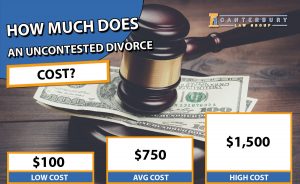How Much Does Divorce Cost If Both Parties Agree?

According to LegalZoom, the average uncontested divorce will cost $3,750 in the U.S. Prices can range from $2,500-$5,000 depending on several factors related to the process. For example, you can expect to pay anywhere from $150-$400 per hour for a family law attorney. Let’s look at few details that can determine how much this process will cost when both parties agree to the divorce.
How Much Does An Uncontested Divorce Cost?
A large amount of money can be saved if your spouse and you can agree to divorce, how the divorce will take place and how your lives are going to be separated. This situation often leads to what is known as an “uncontested divorce.” The total cost will be determined by several aspects.
If you have no issue with becoming a part of the legal procedures of your state, the cost may well be under $500. It will obviously be higher if you utilize the services of an attorney.
Here is a quick look at the national average costs of an uncontested divorce:
- Lowest Cost: $2,500.
- Average Cost: $3,750.
- Highest Cost: $5,000.
Uncontested Divorce Cost With A Lawyer
When you have decided to use the services of a lawyer, the cost of a divorce that is uncontested will vary depending on the lawyer you hire, where you reside and the fee/payment arrangement. Flat fees are often charged by attorneys for cases of uncontested divorces. However, some attorneys prefer to charge retainer fees.
These are deposits billed (usually on a monthly basis_ against the value of any services and hours that have been rendered in the case. Flat fees, depending on the complexity of your situation can run from $200 to about $1,500 per person. Retaining an attorney is likely to bring rates ranging from $150-$400 per hour, billed against your initial deposit. Do not be surprised that attorneys in large population centers charge more money than attorneys in rural locations.
How To Use The Collaborative Divorce Process
Collaborative divorce can result in a divorce that’s relatively free of stress. This can be the case even if the agreement between partners is not complete. A lawyer advocates for both parties to come to fair conclusions.
During the mediation process, a third party (strictly neutral) will work with the spouses to make agreements without the need for a judge present. An uncontested divorce is often the best option for couples that can come to agreements on the most important issues.
Source:
- How Does Collaborative Divorce Work And Is It Right For You? Retrieved December 10, 2024. from https://www.divorcenet.com/resources/how-does-collaborative-divorce-work-and-is-it-right-for-you.html
Speak With Our Divorce Lawyers in Arizona
Contact Canterbury Law Group today if you need an experienced child custody lawyer or guardianship lawyer in Phoenix or Scottsdale, Arizona to help with your case. Our experienced family law attorneys will work with you to achieve the best outcome for your situation. Call today for an initial consultation! 480-744-7711










